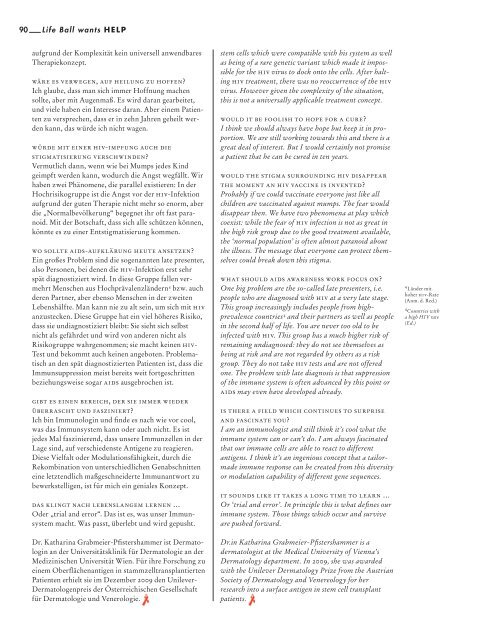Create successful ePaper yourself
Turn your PDF publications into a flip-book with our unique Google optimized e-Paper software.
90 <strong>Life</strong> <strong>Ball</strong> wants help<br />
aufgrund der Komplexität kein universell anwendbares<br />
Therapiekonzept.<br />
wäre es verwegen, auf heilung zu hoffen?<br />
Ich glaube, dass man sich immer Hoffnung machen<br />
sollte, aber mit Augenmaß. Es wird daran gearbeitet,<br />
und viele haben ein Interesse daran. Aber einem Patienten<br />
zu versprechen, dass er in zehn Jahren geheilt werden<br />
kann, das würde ich nicht wagen.<br />
würde mit einer hiv-impfung auch die<br />
stigmatisierung verschwinden?<br />
Vermutlich dann, wenn wie bei Mumps jedes Kind<br />
geimpft werden kann, wodurch die Angst wegfällt. Wir<br />
haben zwei Phänomene, die parallel existieren: In der<br />
Hochrisikogruppe ist die Angst vor der hiv-Infektion<br />
aufgrund der guten Therapie nicht mehr so enorm, aber<br />
die „Normalbevölkerung“ begegnet ihr oft fast paranoid.<br />
Mit der Botschaft, dass sich alle schützen können,<br />
könnte es zu einer Entstigmatisierung kommen.<br />
wo sollte aids-aufklärung heute ansetzen?<br />
Ein großes Problem sind die sogenannten late presenter,<br />
also Personen, bei denen die hiv-Infektion erst sehr<br />
spät diagnostiziert wird. In diese Gruppe fallen vermehrt<br />
Menschen aus Hochprävalenzländern 4 bzw. auch<br />
deren Partner, aber ebenso Menschen in der zweiten<br />
Lebenshälfte. Man kann nie zu alt sein, um sich mit hiv<br />
anzustecken. Diese Gruppe hat ein viel höheres Risiko,<br />
dass sie undiagnostiziert bleibt: Sie sieht sich selbst<br />
nicht als gefährdet und wird von anderen nicht als<br />
Risikogruppe wahrgenommen; sie macht keinen hiv-<br />
Test und bekommt auch keinen angeboten. Problematisch<br />
an den spät diagnostizierten Patienten ist, dass die<br />
Immun suppression meist bereits weit fortgeschritten<br />
beziehungsweise sogar aids ausgebrochen ist.<br />
gibt es einen bereich, der sie immer wieder<br />
überrascht und fasziniert?<br />
Ich bin Immunologin und finde es nach wie vor cool,<br />
was das Immunsystem kann oder auch nicht. Es ist<br />
jedes Mal faszinierend, dass unsere Immunzellen in der<br />
Lage sind, auf verschiedenste Antigene zu reagieren.<br />
Diese Vielfalt oder Modulationsfähigkeit, durch die<br />
Rekombination von unterschiedlichen Genabschnitten<br />
eine letztendlich maßgeschneiderte Immunantwort zu<br />
bewerkstelligen, ist für mich ein geniales Konzept.<br />
das klingt nach lebenslangem lernen …<br />
Oder „trial and error“. Das ist es, was unser Immunsystem<br />
macht. Was passt, überlebt und wird gepusht.<br />
Dr. Katharina Grabmeier-Pfistershammer ist Dermatologin<br />
an der Universitätsklinik für Dermatologie an der<br />
Medizinischen Universität Wien. Für ihre Forschung zu<br />
einem Ober flächenantigen in stammzelltransplantierten<br />
Patienten erhielt sie im Dezember 2009 den Unilever-<br />
Derma tologenpreis der Österreichischen Gesellschaft<br />
für Dermatologie und Venerologie.<br />
stem cells which were compatible with his system as well<br />
as being of a rare genetic variant which made it impossible<br />
for the hiv virus to dock onto the cells. After halting<br />
hiv treatment, there was no reoccurrence of the hiv<br />
virus. However given the complexity of the situation,<br />
this is not a universally applicable treatment concept.<br />
would it be foolish to hope for a cure?<br />
I think we should always have hope but keep it in proportion.<br />
We are still working towards this and there is a<br />
great deal of interest. But I would certainly not promise<br />
a patient that he can be cured in ten years.<br />
would the stigma surrounding hiv disappear<br />
the moment an hiv vaccine is invented?<br />
Probably if we could vaccinate everyone just like all<br />
children are vaccinated against mumps. The fear would<br />
disappear then. We have two phenomena at play which<br />
coexist: while the fear of hiv infection is not as great in<br />
the high risk group due to the good treatment available,<br />
the ‘normal population’ is often almost paranoid about<br />
the illness. The message that everyone can protect themselves<br />
could break down this stigma.<br />
what should aids awareness work focus on?<br />
One big problem are the so-called late presenters, i.e.<br />
people who are diagnosed with hiv at a very late stage.<br />
This group increasingly includes people from highprevalence<br />
countries 4 and their partners as well as people<br />
in the second half of life. You are never too old to be<br />
infected with hiv. This group has a much higher risk of<br />
remaining undiagnosed: they do not see themselves as<br />
being at risk and are not regarded by others as a risk<br />
group. They do not take hiv tests and are not offered<br />
one. The problem with late diagnosis is that suppression<br />
of the immune system is often advanced by this point or<br />
aids may even have developed already.<br />
is there a field which continues to surprise<br />
and fascinate you?<br />
I am an immunologist and still think it’s cool what the<br />
immune system can or can’t do. I am always fascinated<br />
that our immune cells are able to react to different<br />
antigens. I think it’s an ingenious concept that a tailormade<br />
immune response can be created from this diversity<br />
or modulation capability of different gene sequences.<br />
it sounds like it takes a long time to learn …<br />
Or ‘trial and error’. In principle this is what defines our<br />
immune system. Those things which occur and survive<br />
are pushed forward.<br />
Dr.in Katharina Grabmeier-Pfistershammer is a<br />
dermatologist at the Medical University of Vienna’s<br />
Dermatology department. In 2009, she was awarded<br />
with the Unilever Dermatology Prize from the Austrian<br />
Society of Dermatology and Venereology for her<br />
research into a surface antigen in stem cell transplant<br />
patients.<br />
4 Länder mit<br />
hoher hiv-Rate<br />
(Anm. d. Red.)<br />
4 Countries with<br />
a high HIV rate<br />
(Ed.)


